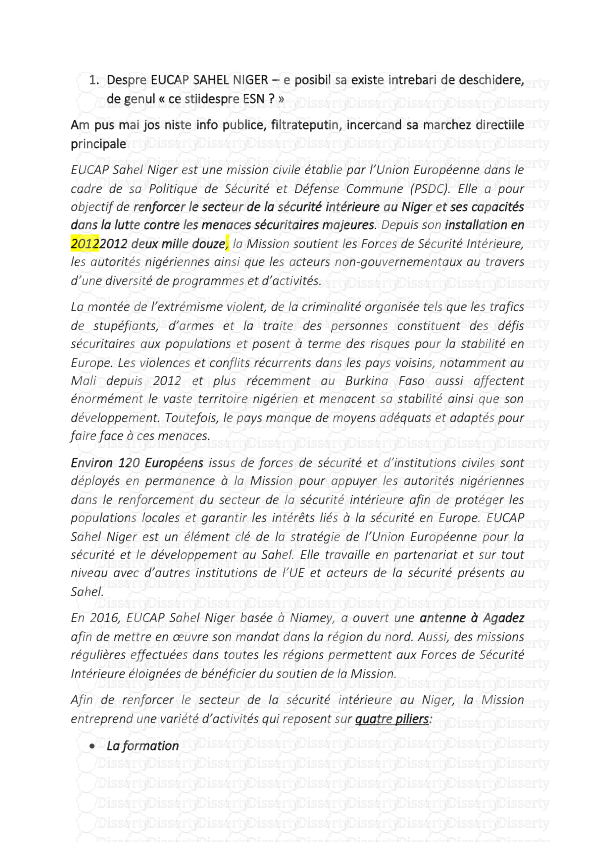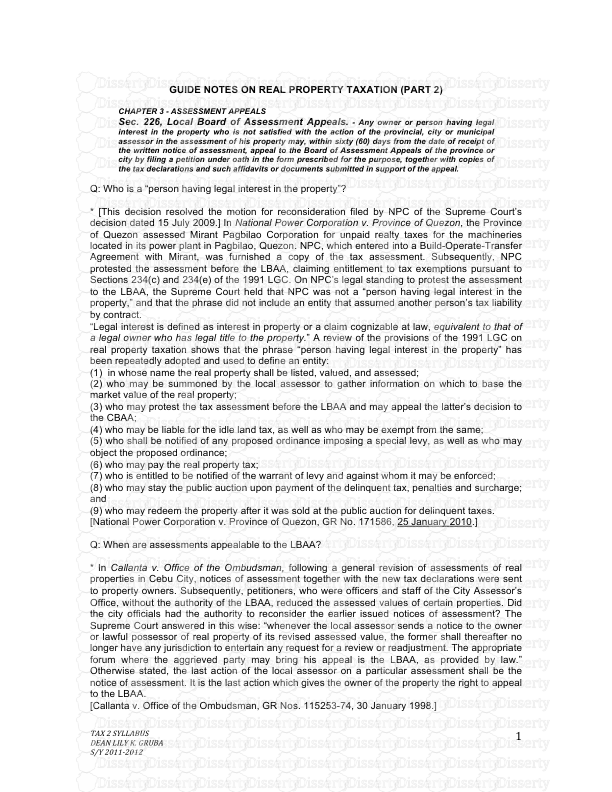TAX 2 SYLLABUS DEAN LILY K. GRUBA S/Y 2011-‐2012 1 GUIDE NOTES ON REAL PROPERT
TAX 2 SYLLABUS DEAN LILY K. GRUBA S/Y 2011-‐2012 1 GUIDE NOTES ON REAL PROPERTY TAXATION (PART 2) CHAPTER 3 - ASSESSMENT APPEALS Sec. 226, Local Board of Assessment Appeals. - Any owner or person having legal interest in the property who is not satisfied with the action of the provincial, city or municipal assessor in the assessment of his property may, within sixty (60) days from the date of receipt of the written notice of assessment, appeal to the Board of Assessment Appeals of the province or city by filing a petition under oath in the form prescribed for the purpose, together with copies of the tax declarations and such affidavits or documents submitted in support of the appeal. Q: Who is a “person having legal interest in the property”? * [This decision resolved the motion for reconsideration filed by NPC of the Supreme Court’s decision dated 15 July 2009.] In National Power Corporation v. Province of Quezon, the Province of Quezon assessed Mirant Pagbilao Corporation for unpaid realty taxes for the machineries located in its power plant in Pagbilao, Quezon. NPC, which entered into a Build-Operate-Transfer Agreement with Mirant, was furnished a copy of the tax assessment. Subsequently, NPC protested the assessment before the LBAA, claiming entitlement to tax exemptions pursuant to Sections 234(c) and 234(e) of the 1991 LGC. On NPC’s legal standing to protest the assessment to the LBAA, the Supreme Court held that NPC was not a “person having legal interest in the property,” and that the phrase did not include an entity that assumed another person’s tax liability by contract. “Legal interest is defined as interest in property or a claim cognizable at law, equivalent to that of a legal owner who has legal title to the property.” A review of the provisions of the 1991 LGC on real property taxation shows that the phrase “person having legal interest in the property” has been repeatedly adopted and used to define an entity: (1) in whose name the real property shall be listed, valued, and assessed; (2) who may be summoned by the local assessor to gather information on which to base the market value of the real property; (3) who may protest the tax assessment before the LBAA and may appeal the latter’s decision to the CBAA; (4) who may be liable for the idle land tax, as well as who may be exempt from the same; (5) who shall be notified of any proposed ordinance imposing a special levy, as well as who may object the proposed ordinance; (6) who may pay the real property tax; (7) who is entitled to be notified of the warrant of levy and against whom it may be enforced; (8) who may stay the public auction upon payment of the delinquent tax, penalties and surcharge; and (9) who may redeem the property after it was sold at the public auction for delinquent taxes. [National Power Corporation v. Province of Quezon, GR No. 171586, 25 January 2010.] Q: When are assessments appealable to the LBAA? * In Callanta v. Office of the Ombudsman, following a general revision of assessments of real properties in Cebu City, notices of assessment together with the new tax declarations were sent to property owners. Subsequently, petitioners, who were officers and staff of the City Assessor’s Office, without the authority of the LBAA, reduced the assessed values of certain properties. Did the city officials had the authority to reconsider the earlier issued notices of assessment? The Supreme Court answered in this wise: “whenever the local assessor sends a notice to the owner or lawful possessor of real property of its revised assessed value, the former shall thereafter no longer have any jurisdiction to entertain any request for a review or readjustment. The appropriate forum where the aggrieved party may bring his appeal is the LBAA, as provided by law.” Otherwise stated, the last action of the local assessor on a particular assessment shall be the notice of assessment. It is the last action which gives the owner of the property the right to appeal to the LBAA. [Callanta v. Office of the Ombudsman, GR Nos. 115253-74, 30 January 1998.] TAX 2 SYLLABUS DEAN LILY K. GRUBA S/Y 2011-‐2012 2 ** In Systems Plus Computer College of Caloocan City v. Local Government of Caloocan City, petitioner claimed its parcels of land were exempted from payment of real property tax pursuant to Article VI, Section 28(3) of the 1987 Constitution and relevant provisions of the 1991 LGC. It further claimed that the city government’s denial of the application for tax exemption was not an “assessment” that was appealable to the LBAA. The Supreme Court held that the denial of the application was deemed an assessment, thus: “[u]nder Section 199(f), Title II, Book II, of the Local Government Code of 1991, ‘assessment’ is defined as the act or process of determining the value of a property, or proportion thereof subject to tax, including the discovery, listing, classification and appraisal of properties. Viewed from this broader perspective, the determination made by the respondent City Assessor with regard to the taxability of the subject real properties squarely falls within its power to assess properties for taxation purposes subject to appeal before the Local Board of Assessment Appeals.” [Systems Plus Computer College of Caloocan City v. Local Government of Caloocan City, GR No. 146382, 7 August 2003.] Q: What is the effect of failure to appeal to the LBAA within the prescribed period? * In FELS Energy, Inc. v. Province of Batangas, a lease contract was entered into between National Power Corporation and Polar Energy, Inc. (which later assigned its rights to FELS Energy, Inc.) over power barges moored at Balayan Bay in Calaca, Batangas. In 1995, FELS received an assessment of realty taxes on the power barges from the Provincial Assessor. Instead of appealing to the LBAA as stated in the notice of assessment and as required by Section 226 of the 1991 LGC, NPC opted to file a motion for reconsideration of the Provincial Assessor’s decision. The Supreme Court held that the remedy chosen by petitioners was not sanctioned by law. Since petitioners failed to appeal the assessment in due course, the Provincial Assessor’s assessment became final, executory, and demandable. Perfection of an appeal within the period therefor is both mandatory and jurisdictional. [FELS Energy, Inc. v. Province of Batangas, GR Nos. 168557 and 170628, 16 February 2007.] ** In Davao Oriental Electric Cooperative, Inc. v. Province of Davao Oriental, petitioner received two Notices of Assessments dated 8 October 1985 and 10 October 1985 for real property taxes. Petitioner did not file a protest on the assessments before the LBAA as then required by PD No. 464 and went directly to court. The Supreme Court stated that petitioner failed to exhaust its administrative remedies, and the consequence for such failure was that the tax assessments, as computed and issued by the Provincial Assessor, became final. Petitioner was deemed to have admitted the correctness of the assessment of its properties. [Davao Oriental Electric Cooperative, Inc. v. Province of Davao Oriental, GR No. 170901, 20 January 2009.] Sec. 227, Organization, Powers, Duties, and Functions of the Local Board of Assessment Appeals. - (a) The Board of Assessment appeals of the province or city shall be composed of the Registrar of Deeds, as Chairman, the provincial or city prosecutor and the provincial, or city engineer as members, who shall serve as such in an ex officio capacity without additional compensation. (b) The chairman of the Board shall have the power to designate any employee of the province or city to serve as secretary to the Board also without additional compensation. (c) The chairman and members of the Board of Assessment appeals of the province or city shall assume their respective positions without need of further appointment or special designation immediately upon effectivity of this Code. They shall take an oath or affirmation of office in the prescribed form. (d) In provinces and cities without a provincial or city engineer, the district engineer shall serve as member of the Board. In the absence of the Registrar of Deeds, or the provincial or city prosecutor, or the provincial or city engineer, or the district engineer, the persons performing their duties, whether in an acting capacity or as a duly designated officer-in-charge, shall automatically become the chairman or member, respectively, of the said Board, as the case may be. TAX 2 SYLLABUS DEAN LILY K. GRUBA S/Y 2011-‐2012 3 Sec. 228, Meetings and Expenses of the Local Board of Assessment Appeals. - (a) The Board of Assessment appeals of the province or city shall meet once a month and as often as may be necessary for the prompt disposition of appealed cases. No member of the Board shall be entitled to per diems or traveling expenses for his attendance in Board meetings, except when conducting an ocular inspection in connection with a case under appeal. (b) All expenses of the Board shall be charged uploads/Management/ sec-226-local-board-of-assessment-appeals-guide-notes-on-real-property-taxation-part-2.pdf
Documents similaires










-
61
-
0
-
0
Licence et utilisation
Gratuit pour un usage personnel Attribution requise- Détails
- Publié le Jui 27, 2022
- Catégorie Management
- Langue French
- Taille du fichier 0.2778MB


